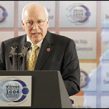
VILNIUS CONFERENCE ON EUROPE’S COMPLETION IN THE EAST
Publication: Eurasia Daily Monitor Volume: 3 Issue: 88

U.S. Vice President Richard Cheney joined the presidents of the three Baltic states, Poland, Ukraine, Moldova, Romania, Bulgaria, and Georgia, as well as other high-level European officials, for a conference on “Common Vision for a Common Neighborhood” on May 3-4 in Vilnius. The common neighborhood is that between the Baltic and the Black Sea-South Caucasus.
The Vilnius Conference ‘06 carries forward a process initiated by Lithuania in 1997 that led to the creation of the Vilnius Ten group of countries in 2000 for common pursuit of Euro-Atlantic integration. Crowned with success through the 2002-2004 “Big Bang” enlargement of NATO, that Vilnius Process continues in a modified form to promote the completion of Europe through integration of countries in Europe’s East — Ukraine, Moldova, Georgia, and Azerbaijan — and work through Euro-Atlantic institutions toward that goal. Lithuania’s initiatives in the Vilnius Process have turned a small country into a significant international actor, as did recently Lithuania’s active role alongside far larger countries in the coalition in Afghanistan.
Lithuanian President Valdas Adamkus urged the Vilnius Conference ’06 to initiate a strategic discussion about policies in Europe’s East on two levels: commitment to reforms on the part of these countries and Western commitment to completion of Europe in the East. However, the context of this effort at present differs markedly from that of the first two rounds of Euro-Atlantic enlargement. Many in Western Europe are no longer aboard such efforts — indeed in some cases obstruct them — while Russia has embarked on a political and economic counteroffensive not only in Europe’s East but within core Europe itself.
Cheney’s address in Vilnius introduced a long-awaited new tone in the Administration’s discourse on Russia: “The [Russian] government has unfairly and improperly restricted the rights of its people. [And] no legitimate interest is served when oil and gas become tools of intimidation and blackmail, either by supply manipulation or attempts to monopolize transportation. And no one can justify actions that undermine the territorial integrity of a neighbor, or interfere with democratic movements.”
Georgian President Mikheil Saakashvili’s speech to the conference focused on Russia’s challenge: “Freedom is under threat, the changes that we once thought were irreversible and universal are now confronted by very serious forces, intent on promoting very different outcomes. Increasingly well-organized and financed, and tolerated in the discourse of today’s European debates … [those] forces in Moscow actively work to undermine our economies, our sovereignty, using such tools as energy dependence, state censorship, and the power of monopolies … The fate of Georgia or Ukraine is not the only one held in the balance. If Europe fails to respond, it puts at risk its very system of governance and European security. Let this be a wake-up call for all European leaders: Without real action and a genuine recognition of what is at stake, we risk a reversal of the wave of liberation that strengthened and unified Europe during the past fifteen years.”
Alongside Georgia, Moldova is being directly targeted by Russia for economic devastation through embargoes on these two countries’ main export commodities — agricultural produce and wine — on the Russian market and manipulation of energy supplies, as well as exploitation of conflicts. President Vladimir Voronin’s speech to the conference reflected the intimidating effect of these Russian pressures on Moldova, Western support for which amounts to only a fraction of the support earned by Georgia. Compared to his speech, however, Voronin’s message in private conversations to the heads of state present in Vilnius was far more straightforward, reflecting his resolve to maintain the country’s European orientation in the face of Russian pressure. However, medium-level State Department officials apparently bucking the White House line and negotiating toward restoration of Russian influence over Moldova are now posing a problem of a different order.
European Union foreign policy chief Javier Solana’s address in Vilnius could for the most part have fitted any place, moment, or forum. Its only novel element was a far-reaching deference to Moscow regarding the “frozen conflicts”: “It is up to the parties to settle these conflicts. But we are willing to help. We do so together with our international partners, including Russia, whose role is crucial. … A similar offer is there for Transnistria and the conflicts in Georgia. But it is up to the parties to take responsibility and bring about a settlement.” In this terminology, “the parties” means Moldova and Transnistria, Georgia and Abkhazia, Georgia and South Ossetia. Solana’s concept would seem to transform Russia from initiator of and party to these conflicts into their bona-fide solver; and EU help seems confined to post-conflict reconstruction, without seriously attempting to shape the political settlements. Further illustrating the drift in EU policy, France and Germany each sent a second-tier official to this summit.
Russia’s use of energy supplies for political leverage was a constant reference point during the conference. Adamkus and Polish President Lech Kaczynski criticized the German government for the signing of gas deals with Russia without even informing, much less consulting with, its partners in the European Union. Meanwhile, Norway’s Statoil, bidder for a stake in Russia’s Shtokman gas field, declines to comment on possible oil deliveries to Lithuania’s Mazeikiai refinery for fear that Moscow could retaliate by excluding Statoil from the Shtokman deal.
(www.vilniusconference2006.lt)




